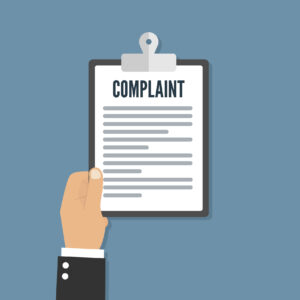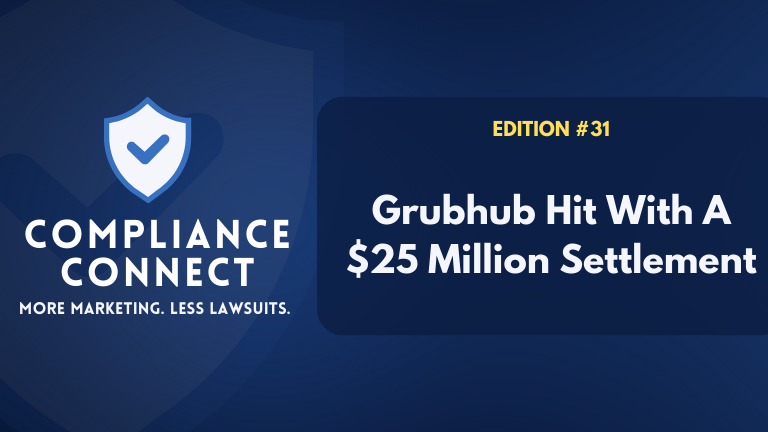Good morning! This is the thirty-first edition of the Compliance Connect newsletter.
The goal is simple: to keep you in the loop on what the FTC and other regulatory agencies are up to so that you can protect yourself.
These newsletters will land in your inbox twice a week – Mondays and Thursdays.
Remember: this is NOT legal advice, only information!
Here’s the rundown today…
- 🍔 Grubhub Hit With A Large Settlement…
- 📄 Breakdown Of The Case…
- 🎲 DraftKings Accused Of False Advertising…
- 🤝 The Surprising Number Of Non-Competes…
- ⚠️ The Danger Of Complaints…
Compliance Digest: What You Should Read Today
Grubhub to pay $25 million in FTC settlement
Grubhub has agreed to pay $25 million to settle an FTC lawsuit alleging deceptive practices that harmed diners, workers, and restaurants.
The company was accused of misleading diners about delivery costs, adding surprise fees like “service fees” or “small order fees,” misrepresenting driver earnings, and listing restaurants without their permission to drive growth.
As part of the settlement, Grubhub will stop surprise fees, remove unaffiliated restaurants from its platform, and improve transparency about driver earnings and account cancellations.
While denying the allegations, Grubhub stated it settled to move forward and avoid further business disruption.
We’ll break down the case in the next section.
Another False Advertising Lawsuit Filed Against DraftKings
DraftKings is facing a class action lawsuit in New York over allegations of deceptive marketing practices related to its “$1,000 Deposit Bonus” promotion.
The lawsuit claims that DraftKings misled users by failing to disclose that the bonus was distributed in small increments over time and required a $5,000 deposit with $25,000 in wagers to qualify.
The suit seeks restitution, statutory damages, and an end to the company’s alleged unfair practices.
This case adds to DraftKings’ legal troubles, including a similar class action in Massachusetts over its marketing tactics.
DraftKings denies wrongdoing but continues to face scrutiny for its advertising methods.

Key Takeaways From The GrubHub Case
Grubhub just settled with the FTC and the State of Illinois for $25 million.
Grubhub is one of the largest online food delivery platforms in the US, operating in over 2,400 cities with millions of diners, restaurants, and drivers using the platform.
Even if you’re not in the food delivery business, Grubhub’s mistakes highlight important lessons for anyone running a digital business or subscription service.
Note: Grubhub denies these allegations. Here is Grubhub’s response to the FTC.
Let’s break down what the FTC says Grubhub did wrong—and what you can learn from it.
#1 – Misleading Pricing
Grubhub displayed low delivery fees upfront but tacked on hidden fees at checkout, such as “service fees” and “small order fees,” which doubled or tripled the original cost.
For example, the FTC noted that Grubhub “artificially lowered its advertised delivery fee” and shifted the actual cost into ambiguous charges described as “other fees.”
These tactics were internally referred to by Grubhub as a “pricing shell game.”
#2 – Earnings Claims
Grubhub made unsubstantiated claims about potential driver earnings, leading drivers to believe they could earn significantly more than was typical.
Grubhub advertised earnings of up to “$26 per hour,” but the median driver earned just $11 per hour in 2023.
Only the top 2% of drivers earned the advertised rate, and the FTC found no SUBSTANTIATION for the claims.
#3 – ROSCA Violations
Grubhub’s subscription service, Grubhub+, violated the Restore Online Shoppers Confidence Act (ROSCA) by making it difficult for customers to cancel their memberships.
Grubhub used a “multi-page, six-click flow” to hide the cancellation option and repeatedly displayed screens urging users to stay subscribed.
The FTC emphasized that the cancellation process was intentionally complex compared to the “one-click” enrollment.
This has been an important area of focus for the FTC recently.
#4 – Fake Restaurant Listings
Grubhub falsely listed over 320,000 restaurants on its platform without their consent, misleading diners into believing the restaurants were affiliated with Grubhub.
The complaint highlighted how Grubhub executives referred to these unauthorized listings as a “mechanism to gain national scale.”
This practice caused significant harm to restaurants, including negative reviews and reputational damage.
#5 – Not Honoring Gift Cards
Grubhub froze user accounts holding large gift card balances without notifying the users or providing a way to regain access to their funds.
The FTC reported that diners frequently lost hundreds or thousands of dollars when their accounts were blocked.
One internal document revealed that “97% of blocked diners during one particular month were never unblocked,” meaning their funds were effectively confiscated.
With all of that said, here are some key lessons for your business…
- Be Transparent With Pricing: Clearly communicate all fees upfront to avoid misleading customers.
- Substantiate Earnings Claims: Back your claims with verifiable data to maintain credibility and compliance.
- Simplify Subscription Cancellation: Make canceling subscriptions as easy as signing up to comply with ROSCA and foster trust.
- Build Ethical Partnerships: Only list or affiliate with partners who have given explicit consent.
- Honor Customer Funds: Ensure customers can access the funds they’ve entrusted to your platform.
Here’s a link to the full complaint.
Did You Know…
An estimated 18% of workers are covered by non-compete clauses, which the FTC is attempting to ban.

Quick Compliance Tip: Complaints
In Greg’s experience, complaints are the primary attention getter for regulators. A loud complaining customer base can be the death knell to a company.
There is no magic number of complaints that gets you in trouble; it’s all relative.
Sometimes a single complaint gets published in the national media and quickly creates lawsuits at multiple levels.
A large number of complaints is usually a clear and strong indicator that your business has issues, and it’s only a matter of time until the regulators take notice.
You want to specifically look out for…
- Internal complaints
- Customer support complaints
- BBB complaints
- FTC complaints
- AG complaints
In fact, it’s a MYTH that your customers have to complain directly to the FTC for them to consider investigating you. That simply isn’t true.
The FTC shares a “complaint database” called Sentinel that compiles all company complaints with the BBB, the FTC, state departments, the Attorney General, and others.
It’s a tool that only the government has access to, not private attorneys.
Bottom line: do whatever it takes to reduce the number of complaints from your customers.
